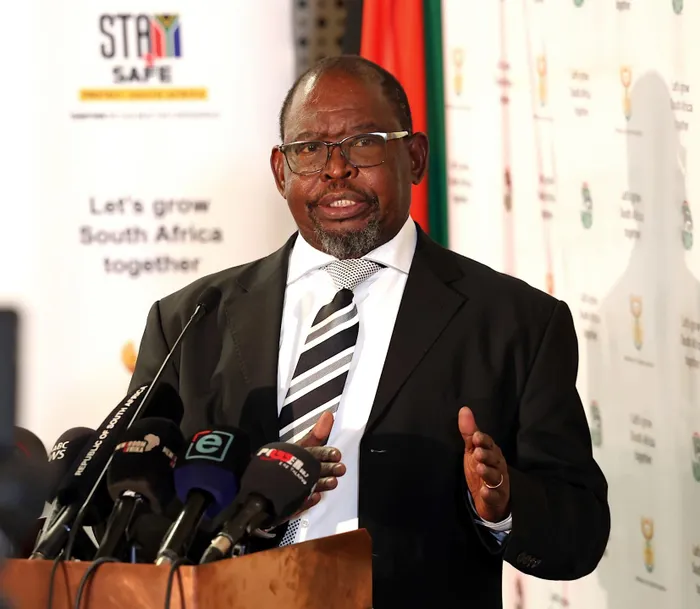Godongwana under pressure to maintain spending

Finance Minister Enoch Godongwana is under pressure to steer clear of austerity measures and ensure that SARS is properly funded, and introduce a wealth tax.
Image: Supplied
As Finance Minister Enoch Godongwana prepares to present the Budget for the 2025/26 financial year on Wednesday, he finds himself balancing on a tightrope amid mounting public pressure.
This is as some want the South African Revenue Service (SARS) to be properly funded to collect more tax, while others persist that Godongwana should introduce wealth tax and draw down from the Gold and Foreign Exchange Contingency Reserve Account (GFECRA).
However, Godongwana has previously stated that South Africa already has a multitude of instruments that tax wealth comprehensively, while the National Treasury stated that GFECRA was designed to protect the credibility, independence, and stability of SARB and the economy.
It will be the third time Godongwana tables the Budget after he postponed the initial presentation in February following warnings from the DA to withdraw its support.
He scrapped plans to increase VAT amid a court case with the DA and the EFF, as well as negotiations with the ANC and the smaller political parties.
Business Leadership South Africa CEO Busi Mavuso said a technical question that must be answered was what expenditure cuts will have the least damage on growth or service delivery.
“I hope the Finance Minister will be able to announce credible steps to reduce expenditure, and I hope we quickly see the political support to do so. That is what will give comfort to investors that we are a country that can politically manage its finances appropriately,” she added.
Investec’s treasury economist Tertia Jacobs said the scrapping of the VAT increase necessitated a reduction in spending to maintain a neutral impact on the Budget deficit.
“The focus now will be on where the said spending will be lowered, and the ability of the so-called ‘GNU’ to craft a way forward that both demonstrates its priorities and allows for consensus,” said Jacobs.
“We think that the Minister of Finance could announce a spending review in the October 2025 Medium-Term Budget Policy Statement (MTBPS).”
Rise Mzansi leader Songezo Zibi said with increasing borrowing and VAT increase out of the question, there was one thing for the minister to do.
“It is to cut expenditure over the next three years, and that is the increment. Initially, he had proposed about R173 billion. He reduced that in March to R140 something billion, and he is going to reduce it again to plug the hole.
“If we all understand that, then the Budget should be able to pass easily because that is the only option Parliament has left the Finance Minister with,” said Zibi.
The EFF demanded during its Monday march that Budget cuts be reversed and funding be increased for public health, basic education, policing, and defence.
The Red Berets also demanded a progressive tax on high net-worth individuals and legislation on anti-tax avoidance laws, and building the capacity of SARS to recover billions hidden in tax havens.
ActionSA MP Alan Beesley called on Godongwana yesterday to present a Budget that serves all South Africans.
“Budget 3.0 must protect hard-pressed South Africans from higher taxes, ensure SARS is properly funded, address the rampant corruption in government departments and SOEs, and lay the foundations for meaningful economic growth,” Beesley said.
GOOD Party said it will support the fiscal framework and work in good faith to identify constructive alternatives to VAT hike and personal income tax bracket creep.
“GOOD’s preference remains clear that revenue measures should target those with the greatest means, not those with the least,” secretary-general Brett Herron said.
Herron said GOOD Party backed a temporary drawdown from the GEFECRA, and the introduction of the wealth tax targeting ultra-high-net-worth individuals to begin addressing South Africa’s extreme inequality.
The Institute for Economic Justice (IEJ) said there was consensus that the upcoming Budget must cement the break from spending cuts and utilise the national Budget to achieve inclusive growth.
“The growing political consensus against budget cuts, including from the main partner in the GNU, the ANC, is a vital step forward, but without progressive revenue measures to fund this shift, the opportunity to adopt a pro-poor and pro-growth budget for the first time in more than a decade will be lost,” IEJ tax and budget policy researcher Zimbali Mncube said.
The IEF said the immediate measures to raise revenue included drawing down from GFECRA, removing tax breaks for high-income earners, and restoring the corporate income tax.
Federation of Unions of South Africa (Fedusa) said the government should reject austerity as a fiscal policy response and instead adopt a more inclusive and progressive budgetary framework.
Fedusa also threw its weight behind the introduction of a wealth tax on high-net-worth individuals to help redistribute wealth and ease pressure on the tax base without undermining the purchasing power of ordinary South Africans.
BOSA acting spokesperson Roger Solomons said Godongwana should boldly prioritise economic growth, job creation, and fiscal responsibility to kick-start progress and change.
“The choices made in this Budget must reflect the urgent realities of our people,” said Solomons.
He also said the Budget should increase spending on infrastructure-led growth, cut the national debt, cut the Cabinet and all of its thrills and frills, and resist the urge to extend the Social Distress Grant indefinitely, among other things.
Cape Argus
Related Topics: